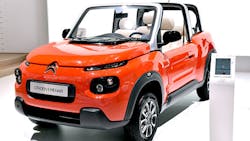Tesla Gets More Rivals as VW Scandal Clouds Diesel
With the future of diesel in question in the wake of Volkswagen AG’s emissions-cheating scandal, electric vehicles that have long struggled to find buyers in Europe are finally getting endorsed by major carmakers.
At the Geneva International Motor Show this week, automakers from mass-market PSA Peugeot Citroen to upscale Daimler AG’s Mercedes-Benz promised to challenge Tesla Motors Inc. with electric cars that have longer ranges and more affordable prices. After largely sidelining the technology in recent years amid sluggish demand, the revived interest in battery-powered cars is necessary for automakers to meet tighter European Union regulations for carbon-dioxide emissions starting in 2020.
The Volkswagen scandal gave other automakers a “push toward electric cars,” Karl-Thomas Neumann, head of General Motors Co.’s Opel unit, said in an interview. The German-based brand plans to roll out the Ampera-e next year. It’s Opel’s first electric-powered car since the 2011 Ampera plug-in hybrid, which struggled to lure buyers because of its high price.
Diesel engines are typically 25% more efficient than gasoline versions, making them critical to lowering CO2 emissions. But Volkswagen’s revelation in September that it cheated on diesel lab tests for years increases scrutiny of the technology and threatens to blow a hole in plans to meet regulatory requirements. That makes once-eschewed battery cars unavoidable for the manufacturers, even if consumers aren’t biting yet.
Citroen E-Mehari
“You see a very nice trend about electric vehicles, so we are developing our own technology and we are happy with that,” said Peugeot Chief Executive Officer Carlos Tavares. The French company, which presented the Citroen E-Mehari electric off-road concept in Geneva, has been largely dependent on diesel technology. Its first electric cars--the Peugeot iOn and Citroen C-Zero --were rebadged versions of Mitsubishi Motors Corp.’s i-MiEV.
Volkswagen, meanwhile, has made electric vehicles a linchpin of its plan for recovering from the crisis, accelerating a push to add 20 additional plug-in hybrid and battery-powered cars to its lineup by 2020. That includes the first battery-powered vehicle for the Porsche sports-car brand as well as an electric Audi crossover. And its promising new leaps in technology, including ranges of more than 500 kilometers (310 miles) by the end of the decade.
“Charging will only take as long as a coffee break,” instead of hours, Volkswagen CEO Matthias Mueller said in Geneva. “And in the long term, an electric car will cost less than a car with an internal combustion engine.”
Such technology advances will help electric cars eventually. But in the meantime, demand is tepid, with the clean-running vehicles accounting for just 0.68 percent of sales in western Europe, according to Automotive Industry Data Ltd. Much of that demand comes from Norway, where electric cars enjoy generous perks such as tax exemptions and free charging. In Germany, where there are limited benefits, just over 30,000 have been sold to date. Cheap oil prices provide little incentive for consumers to take the leap.
Fiat Abstaining
“The market for electric cars in Europe has been extremely disappointing,” said Peter Schmidt, chief editor of Automotive Industry Data. “Five years ago, carmakers were really optimistic, but at the moment, in my view they will be lucky if the market share reaches 1% by 2020.”
Automakers are hoping politicians come to the rescue. BMW AG CEO Harald Krueger was among industry leaders at the show lobbying for state help, including sales incentives and assistance in adding public charging stations. “We need government support to boost sales,” said the executive, who is leading talks with the German government. The Munich-based carmaker hasn’t introduced a fully electric vehicle since the i3 city car in 2013.
But not all in the auto industry are rushing to roll out their own versions of cars like the Tesla Model X SUV, which made its European debut in Geneva. Sergio Marchionne, CEO of Fiat Chrysler Automobiles NV, said he would rather make profit than follow Tesla.
“I can’t make money building a car like Tesla,” Marchionne said. “So for the time being I am abstaining.”
About the Author
Bloomberg
Licensed content from Bloomberg, copyright 2016.
